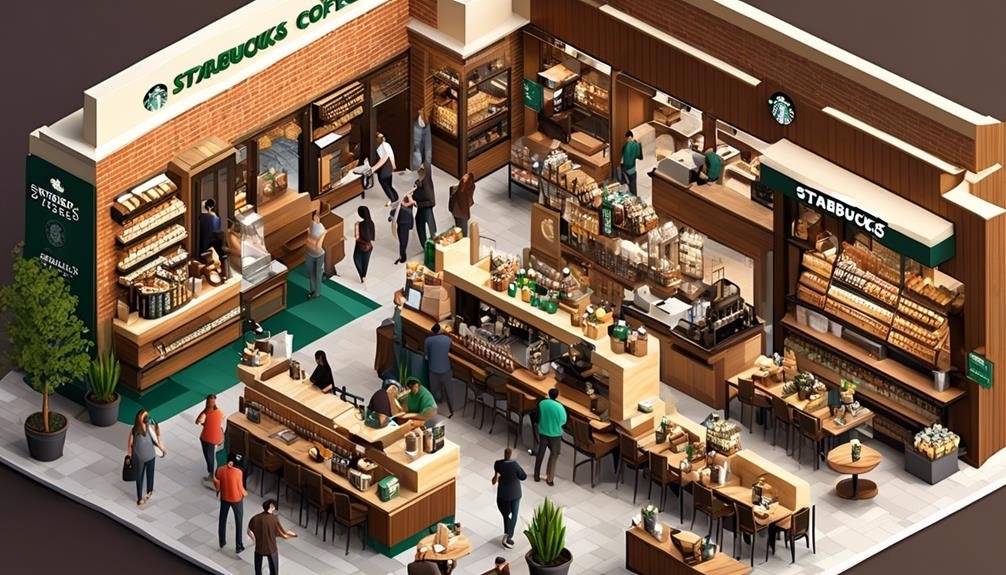Have you ever wondered how Starbucks managed to revolutionize the coffee industry and become a global phenomenon?
From its humble beginnings in Seattle to its ubiquitous presence in cities around the world, Starbucks has undeniably left an indelible mark on the world of coffee.
In this discussion, we will explore the various ways in which Starbucks has changed the coffee industry.
From redefining the café experience to shaping consumer preferences and influencing competitors, Starbucks has had a remarkable impact on the world's favorite caffeinated beverage.
Key Takeaways
- Starbucks popularized the concept of the café as a 'third place' and redefined the café experience by introducing customization, variety, and coffee education.
- Starbucks expanded coffee culture globally through its global expansion, partnership with local growers, and implementation of sustainable practices.
- Starbucks influenced consumer preferences and tastes by introducing specialty coffee, customization, and transforming coffee drinking into a social experience.
- Starbucks shaped coffee roasting and brewing techniques by popularizing darker roast profiles, introducing a wide range of espresso-based drinks, and driving the development of new brewing techniques.
Rise of the Specialty Coffee Movement
The rise of the specialty coffee movement has transformed the coffee industry, offering discerning coffee enthusiasts a unique and elevated experience. Specialty coffee refers to high-quality coffee that's carefully sourced, roasted, and brewed to bring out the unique flavors and characteristics of each bean.
Unlike mass-produced coffee, specialty coffee is often sourced from specific regions or farms known for producing exceptional beans, resulting in a more distinctive and flavorful cup of coffee.
This movement has been driven by a growing demand for a more personalized and artisanal coffee experience. Coffee consumers are no longer satisfied with generic, mass-produced blends that lack complexity and flavor. They seek out specialty coffee shops that prioritize quality and craftsmanship, where baristas have extensive knowledge and expertise to ensure the perfect cup of coffee.
Specialty coffee has also brought attention to the importance of sustainability and ethical practices in the coffee industry. Many specialty coffee shops prioritize working directly with farmers, ensuring fair wages and sustainable farming practices. This emphasis on sustainability resonates with coffee enthusiasts who want to support businesses that prioritize social and environmental responsibility.
Redefining the Café Experience
With the rise of the specialty coffee movement reshaping the coffee industry, it's important to examine how this has led to a redefinition of the café experience. Starbucks played a significant role in this transformation by introducing several key changes that have become standard in cafés today.
Here are three ways Starbucks has redefined the café experience:
- The third place concept: Starbucks popularized the idea of the café as a 'third place' between work and home. By creating a welcoming and comfortable environment, complete with free Wi-Fi and cozy seating, Starbucks made cafés a destination for socializing, working, or simply enjoying a cup of coffee.
- Customization and variety: Starbucks revolutionized the way we order coffee by offering an extensive menu of customizable options. From milk alternatives to flavored syrups and different brewing methods, customers now have the freedom to personalize their coffee exactly to their liking.
- Coffee education: Starbucks introduced a new level of coffee knowledge and expertise to the café experience. With their highly trained baristas and educational materials, customers can learn about different coffee origins, brewing techniques, and even participate in coffee tasting events.
Through these changes, Starbucks transformed cafés into inclusive, interactive spaces that prioritize customer preferences and foster a sense of community. The café experience is no longer just about grabbing a quick cup of coffee; it has become an immersive and personalized journey into the world of specialty coffee.
Expanding Coffee Culture Globally
Starbucks' global expansion has played a pivotal role in spreading coffee culture to all corners of the world. With its iconic green logo, Starbucks has become synonymous with the coffee experience, and its presence can now be found in over 80 countries. By opening stores in diverse locations, Starbucks hasn't only introduced its signature beverages to new markets but has also influenced local coffee cultures.
One of the ways in which Starbucks has expanded coffee culture globally is by promoting the idea of a 'third place.' The concept of a third place, a space other than home or work where people can gather and relax, has become a fundamental part of Starbucks' brand identity. Through its inviting store designs and comfortable seating, Starbucks has encouraged people to embrace coffee as a social experience, fostering a sense of community wherever its stores are located.
Furthermore, Starbucks has made significant efforts to source coffee beans from around the world, introducing customers to different flavors and varieties. By partnering with local growers and implementing sustainable practices, Starbucks hasn't only provided economic opportunities to coffee-growing communities but has also educated customers about the origins and quality of their coffee.
Influencing Consumer Preferences and Tastes
Consumers around the world have been heavily influenced by Starbucks, transforming their preferences and tastes in the realm of coffee. With its global presence and innovative approach, Starbucks has played a significant role in shaping consumer behavior and shaping the coffee industry. Here are three key ways in which Starbucks has influenced consumer preferences and tastes:
- Introduction of Specialty Coffee: Starbucks introduced consumers to the concept of specialty coffee, offering a wide range of flavors, blends, and brewing methods. This expanded the taste options beyond traditional black coffee and encouraged consumers to explore new flavors and experiences.
- Emphasis on Customization: Starbucks popularized the idea of customizable coffee, allowing customers to tailor their drinks to their unique preferences. From choosing the type of milk to adding syrups and toppings, Starbucks empowered consumers to have control over their coffee experience.
- Creating a Third Place: Starbucks transformed coffee drinking from a solitary activity to a social experience. By creating inviting and comfortable spaces, Starbucks encouraged customers to linger, socialize, and enjoy their coffee in a relaxed environment. This concept of the 'third place' became a significant influence on consumer preferences for coffee shop ambiance.
Through these strategies, Starbucks hasn't only influenced consumer preferences but also set new standards for the coffee industry. Its impact can be seen in the growing demand for specialty coffee, the rise of customization options in other coffee chains, and the importance placed on creating welcoming coffee shop spaces.
Shaping the Coffee Roasting and Brewing Techniques
The impact of Starbucks on consumer preferences and tastes extends beyond just influencing their choices, as the company has also played a significant role in shaping the coffee roasting and brewing techniques used in the industry.
Starbucks revolutionized the coffee industry by introducing a darker roast profile to their customers. Prior to Starbucks, lighter roasts were more common, but the company's preference for a bolder, more robust flavor profile influenced the industry to adopt darker roasting techniques. This shift in roasting techniques resulted in a richer, more intense flavor that became synonymous with Starbucks' brand.
In addition to roasting techniques, Starbucks also popularized the use of espresso-based drinks. The company introduced a wide range of espresso beverages, such as lattes, cappuccinos, and macchiatos, which weren't as widely consumed before. Starbucks' emphasis on espresso-based drinks led to the development of specialized espresso machines and techniques for brewing espresso. As a result, coffee shops and cafes around the world started offering a broader range of espresso-based options, catering to the growing demand for these beverages.
Starbucks' influence on coffee roasting and brewing techniques has been transformative. The company's commitment to quality and innovation has pushed the industry to experiment and evolve. Today, we see a wide variety of coffee roasts and brewing methods available, thanks in part to Starbucks' pioneering efforts.
Whether you prefer a dark roast or a lighter one, whether you enjoy a traditional drip brew or a specialty espresso-based drink, Starbucks has undoubtedly left its mark on the coffee industry's roasting and brewing practices.
Pioneering Sustainable and Ethical Sourcing Practices
One of the key contributions made by Starbucks to the coffee industry is its pioneering of sustainable and ethical sourcing practices. Starbucks has recognized the importance of sourcing coffee beans in a sustainable and ethical manner, considering the impact on the environment and the communities involved. Here are three ways in which Starbucks has led the way in this area:
- Ethical Farming Standards: Starbucks established its own set of ethical sourcing guidelines, known as the Coffee and Farmer Equity (C.A.F.E.) Practices. These standards ensure that coffee farmers are treated fairly, paid a fair wage, and provided with safe working conditions. By adhering to these practices, Starbucks helps to improve the livelihoods of coffee farmers and their communities.
- Supporting Smallholder Farmers: Starbucks has made a commitment to source a significant portion of its coffee from smallholder farmers, who often face challenges in accessing markets and receiving fair prices. By working directly with these farmers and providing support and training, Starbucks empowers them to improve the quality of their coffee and increase their incomes.
- Environmental Stewardship: Starbucks has implemented various initiatives to promote environmental sustainability in the coffee industry. This includes supporting farmers in adopting sustainable farming practices, such as shade-grown coffee and water conservation techniques. Starbucks also invests in research and development to find innovative solutions for reducing the environmental impact of coffee production.
Innovating the Menu With Signature Drinks and Flavors
With a commitment to innovation and creativity, Starbucks has continually pushed the boundaries of the coffee industry by introducing an array of signature drinks and flavors to its menu. By constantly experimenting with new combinations and ingredients, Starbucks has managed to captivate its customers and revolutionize the coffee experience. These signature drinks and flavors have become synonymous with the Starbucks brand and have played a significant role in its success.
Here is a table showcasing some of Starbucks' most popular signature drinks and flavors:
| Signature Drinks | Flavors |
|---|---|
| Caramel Macchiato | Caramel |
| Pumpkin Spice Latte | Pumpkin |
| White Chocolate Mocha | White Chocolate |
| Frappuccino | Various flavors like Mocha, Vanilla, and Caramel |
| Green Tea Frappuccino | Matcha Green Tea |
These drinks and flavors have not only attracted new customers but also created a sense of loyalty among existing ones. Starbucks has managed to create a unique experience for its customers by offering a wide range of options that cater to different tastes and preferences. Whether you enjoy the rich and creamy taste of a White Chocolate Mocha or the comforting flavors of a Pumpkin Spice Latte, Starbucks has something for everyone.
Impact on Competitors and the Coffee Industry as a Whole
By revolutionizing the coffee experience through its innovative menu and signature drinks, Starbucks has had a profound impact on its competitors and the coffee industry as a whole. Here are three key ways Starbucks has influenced the coffee industry:
- Raising the bar for quality: Starbucks introduced a new level of quality and consistency in coffee that forced competitors to improve their offerings. The company's commitment to sourcing high-quality beans and training its baristas to deliver a consistent experience set a new standard for the industry. Competitors had to step up their game to keep up with Starbucks' success.
- Expanding the coffee shop culture: Starbucks played a significant role in popularizing the notion of coffee shops as social gathering places. The company's inviting atmosphere, comfortable seating, and free Wi-Fi attracted customers to spend more time in their stores. This change in consumer behavior led to the rise of the 'third place' concept, where people could work, relax, and socialize outside of home and office environments.
- Innovation and diversification: Starbucks wasn't only a pioneer in introducing unique flavors and drinks, but it also sparked innovation in the industry. Competitors began experimenting with their own specialty beverages and expanding their menu options to cater to different tastes. This diversification allowed the coffee industry to reach a broader customer base and attract new demographics.
Frequently Asked Questions
How Did Starbucks Initially Gain Popularity and Establish Itself as a Leading Player in the Coffee Industry?
To initially gain popularity and establish itself as a leading player in the coffee industry, Starbucks captivated customers with its inviting atmosphere, wide variety of specialty drinks, and focus on customer experience, creating a unique and memorable coffee shop experience.
What Steps Did Starbucks Take to Create a Unique and Memorable Café Experience for Its Customers?
To create a unique and memorable café experience, Starbucks took several steps. They focused on creating a cozy atmosphere, offering a wide range of specialty drinks, and providing excellent customer service.
How Did Starbucks Successfully Expand Its Presence Beyond the United States and Become a Global Coffee Culture Phenomenon?
Starbucks successfully expanded globally by adapting to local cultures, offering a consistent and high-quality experience, and leveraging strategic partnerships. Its strong brand, innovative marketing, and customer-centric approach made it a global coffee culture phenomenon.
What Role Did Starbucks Play in Influencing Consumer Preferences and Tastes in Terms of Coffee Consumption?
Starbucks played a significant role in shaping consumer preferences and tastes in coffee consumption. They introduced a new experience, offering a wide variety of specialty drinks and promoting a culture of coffee appreciation.
How Did Starbucks Contribute to the Advancement of Coffee Roasting and Brewing Techniques, and What Innovations Did They Bring to the Industry?
Starbucks revolutionized coffee roasting and brewing techniques by introducing innovative methods that changed the industry. They brought advancements in quality control and consistency, elevating the coffee experience for consumers like you.
Conclusion
In conclusion, Starbucks has played a significant role in revolutionizing the coffee industry.
Through their specialty coffee movement, they've redefined the café experience and expanded coffee culture globally. They've influenced consumer preferences and tastes, shaping the way coffee is roasted and brewed.
Additionally, Starbucks has pioneered sustainable and ethical sourcing practices, setting a standard for the industry. Their innovative menu with signature drinks and flavors has also made a lasting impact.
Overall, Starbucks has left an indelible mark on competitors and the coffee industry as a whole.




